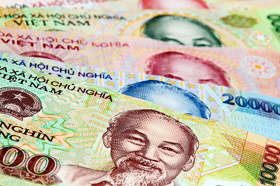The Vietnamese dong, which is one of the least valued currency in the world in terms of monetary units (after the currencies of Iran and Somalia), was little changed over the week, closing at 20,825 per US dollar. The currency has some bullish domestic factors, which may support the dong, but experiences negative influences as well. Conflicting fundamentals result in sideways movement of the currency.
The World Bank said that rapid credit growth and other signs of financial problems in Vietnam hint at coming economic crisis and urged initiation of a reform of the banking system. The nation’s lawmakers confirmed that the government is ready to start a reform, but the impact of the last global crisis can make it difficult to overcome the challenges that the Vietnamese economy is facing. Chairman of the National Financial Supervisory Commission Vu Viet Ngoan said:
The recession in 2008–09 created more challenges for Viet Nam to catch up with other countries in financial reform.
The State Bank of Vietnam lowered ceiling for
Nguyen Van Binh, the Governor of the State Bank of Vietnam, said that the balance of payments reached $10 billion last year, compared to the forecast of $3 billion and the balance of $2.6 billion in 2011. The data of the General Department of Customs showed that the trade balance surplus jumped to the record $780 million in 2012. It was the first surplus since 1993. According to the CIA World Factbook, the country’s trade balance had an estimated deficit of $0.2 billion in 2012.
Prospects for the Vietnamese currency were supported by Fitch Ratings as the rating agency left the country’s
Vietnam’s ratings are underpinned by its track record of strong economic growth and a favourable environment for foreign direct investment that has rendered the economy less vulnerable to external shocks and raised its potential growth rate.
The rating agency added:
The ratings are also supported by favourable overall levels of external debt and debt service relative to rated peers as well as by high levels of domestic savings and investment.
As one can see, there are different and conflicting influences on the Vietnamese currency. On one hand, the good macroeconomic indicators and the general risk positive sentiment on the Forex market are positive for the dong. On the other hand, the accommodative monetary policy (with uncertain impact on the economy) and the threat of economic collapse make the currency less appealing to investors.
The exchange rate of the dong was surprisingly stable over the last couple of years. Last week, USD/VND opened at 20,825 and closed at 20,833. If no major event happens, the currency will likely continue to trade sideways, depreciating slowly over the long term.
If you have any questions, comments or opinions regarding the Vietnamese Dong,
feel free to post them using the commentary form below.



Be First to Comment